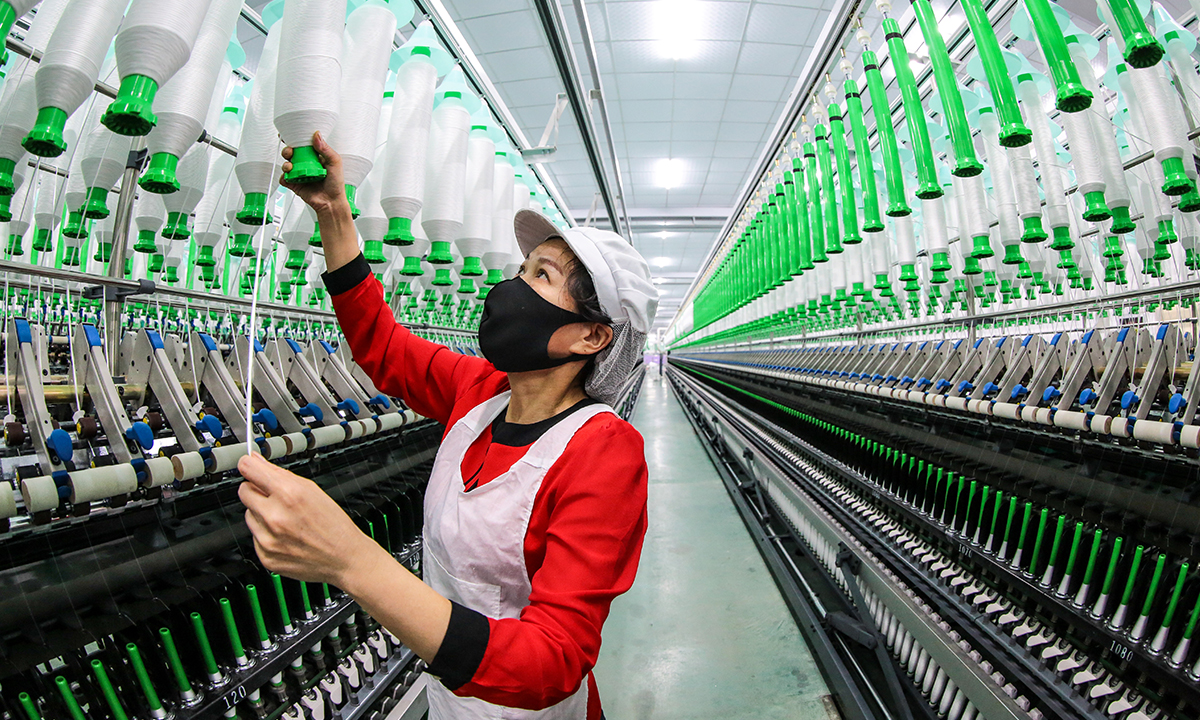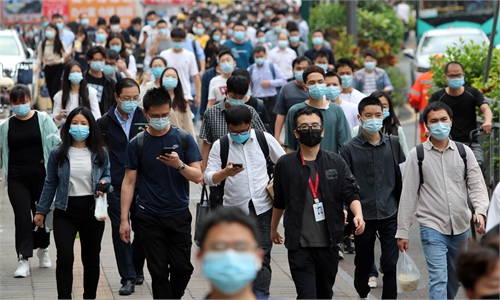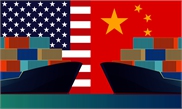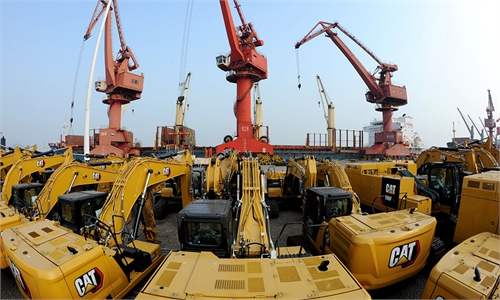China ups ante in ensuring economic development, security as West remains obsessed with sanctions

A staffer works at a workshop of Huarui (China) Sewing Thread Co in Ruichang, East China's Jiangxi Province, on March 20, 2022. The company's new production line uses automation and intelligent technical controls throughout the entire process. The company's products sell well at home and abroad. Photo: cnsphoto
With growing complexities, ranging from the Ukraine conflict to COVID-19 flare-ups across China, setting the scene for more unpredictability, the world's second-largest economy is upping the ante in ensuring both development and security.
Its latest efforts to ensure greater preparedness in maintaining energy reserves and handling major financial risks are seen as exemplifying a development-oriented mind-set that stands in sharp contrast to a sanctions-obsessed mentality prevailing in Western economies, despite their mounting growth woes.
A slew of weighty official remarks and measures over the past month apparently breathed vitality into an economy that is holding to a dynamic zero-COVID policy, while flagging the need for multi-pronged security on energy, food and supply chains and financial fronts. This, in addition to an unwavering vision of a shift toward sci-tech innovation-driven growth, speaks volumes about China's focus on more secure economic growth, observers said.
Consequently, the country has been shown to be capable of tapping its institutional strengths and a focus on economic security to adequately respond to various risks and challenges, they noted. The experts said that this laudable road map differs from a trajectory typifying the US-led disregard for long-term interests for both themselves and the international community as a whole.

Economy growth Illustration: Chen Xia/Global Times
Dialing up economic security commitments
In a fresh move aimed at beefing up China's economic security, the National Development and Reform Commission, China's top economic planner, on Thursday unveiled plans to implement a blueprint for building the Beibu Gulf urban cluster during the 14th Five-Year Plan (2021-25), with the establishment of a pivotal base for energy resources storage and shipments in South China.
The action plan envisions building a maritime natural gas hub and oil reserves base, expanding imports of resource items and enhancing the risk management capabilities of farm produce imports.
The action plan comes amid heightened concerns over energy security, as the West doubles down on its sanctions targeting Russia amid the ongoing Ukraine crisis.
In another major move, the People's Bank of China (PBC), the country's central bank, unveiled financial stability legislation on Wednesday night, including the creation of a financial stability guarantee fund. This legislative progress is seen as boosting China's financial soundness amid lingering woes over a US-led decoupling.
Financial risks, known for their abruptness, spillovers, complexities and relatedness, would have devastating implications for the economy and social development if they become contagious, the PBC said in a statement on its website elaborating on the law's drafting.
Major developed economies have generally moved to enact laws specifically designed to build a unified and coordinated framework for financial stability, the statement continued, describing the legislation as imperative for the country's push to firmly prevent systemic financial risks.
"China's initiative to legislate financial stability is credit positive for Chinese financial institutions because it will provide a legal framework to reduce systemic risks," Nicholas Zhu, vice president and senior credit officer at Moody's Investors Service, wrote in a note sent to the Global Times on Thursday.
"The proposed financial stability security fund will be a new mechanism to mobilize public resources to deal with emerging risks that could threaten financial stability.
"For commercial banks, the draft law, if enacted, will be an important milestone in progressing towards an operational resolution regime with a reasonably clear understanding of the impact of a bank failure and resolution process for depositors and other creditors," Zhu said.
The two major moves build on an array of pro-growth measures over the past month that aim to boost the economy's resilience over the longer term.
For instance, a key meeting by the country's top financial advisory body in mid-March resulted in cranking up confidence in the economy, as the meeting epitomized a comprehensive effort spanning multiple government departments including the PBC, the securities, banking and insurance regulators and the finance ministry.
The meeting assured the market of the country's continued support for the platform economy, a main source of the economy's sci-tech innovation.
As such, the swift and resounding response to market concerns attests to the country's institutional strengths, something that is envied by the West, analysts said.
Steady growth, as underscored multiple times by the central leadership, remains the bottom-line mind-set for China's economic work, experts said, resulting in longer-term optimism from the country's increasing shrewdness in making its economy well prepared for various uncertainties.
More uncertainty, higher pressure
As tensions over Ukraine become more unpredictable, the resultant repercussions on global energy and food supply chains are expected to take a bigger toll on the global economy than previously estimated. This, coupled with the West's misguided hawkishness over China's calls for calm and rationality in resolving the crisis, could weigh on the country's trade prospects, experts said.
In addition, the continued surge in domestic viral infections is arguably also putting more downward pressure on the Chinese economy.
Hopes for progress on peace talks between Russia and Ukraine seem to be fading in the wake of the "Bucha incident," Zhang Hong, an Eastern European studies expert from the Chinese Academy of Social Sciences, told the Global Times on Thursday.
At a press conference on Wednesday, Chinese Foreign Ministry spokesperson Zhao Lijian said the relevant circumstances and specific causes of the incident must be verified and ascertained.
"Before the full picture is clear, all sides should exercise restraint and avoid unfounded accusations," Zhao said.
Misguided by distortions of China's neutral stance on the Ukraine conflict, the EU is likely to become more hawkish in its China policy, Zhang said.
"China-EU relations are set to come under greater pressure as the Ukraine crisis, previously expected to be settled by early May, could well be extended," he continued.
That could suggest more trade headwinds as well as a protracted fallout on the economy from the supply chain disruptions as a result of the conflict, experts said.
The Russia-Ukraine conflict has boosted global inflation, which was already very high in the developed West, as reflected by price hikes in energy, non-ferrous metals and even food, which might result in some imported inflationary pressure on China, according to Lian Ping, head of the Zhixin Investment Research Institute.
The continued spikes in domestic coronavirus outbreaks, notably in the financial hub of Shanghai, arguably shine a spotlight on the worst-hit parts of the economy, with calls rising from market watchers to step up monetary and fiscal support for households and businesses hit hard by the flare-ups.
The domestic caseload in Shanghai continues to rise, with the addition of 322 confirmed infections and 19,660 asymptomatic cases on Wednesday, official data showed.
If the virus situation in the country's financial hub can be brought under control within this month, it's estimated that the local viral development will chip away at China's full-year GDP growth by 0.2 percentage points, according to Tian Yun, a Beijing-based economist.
The World Bank on Monday brought down its 2022 growth projection for East Asia and Pacific, including China, to 5 percent, lower than its 5.4 percent forecast in October.
China, which makes up 86 percent of regional output, "is projected to grow 5 percent in the baseline and 4 percent in the downside scenario," according to the Washington-based lender, citing the viral resurgence.
Keeping stability as the bottom line in the country's mind-set, Lian stressed that effective macro policies should catch up in time. "Currently, the fiscal policy is being actively promoted and its arrangements are comprehensive."
The country has the ability, will and space to use macro policies to stabilize economic growth, he stressed.



